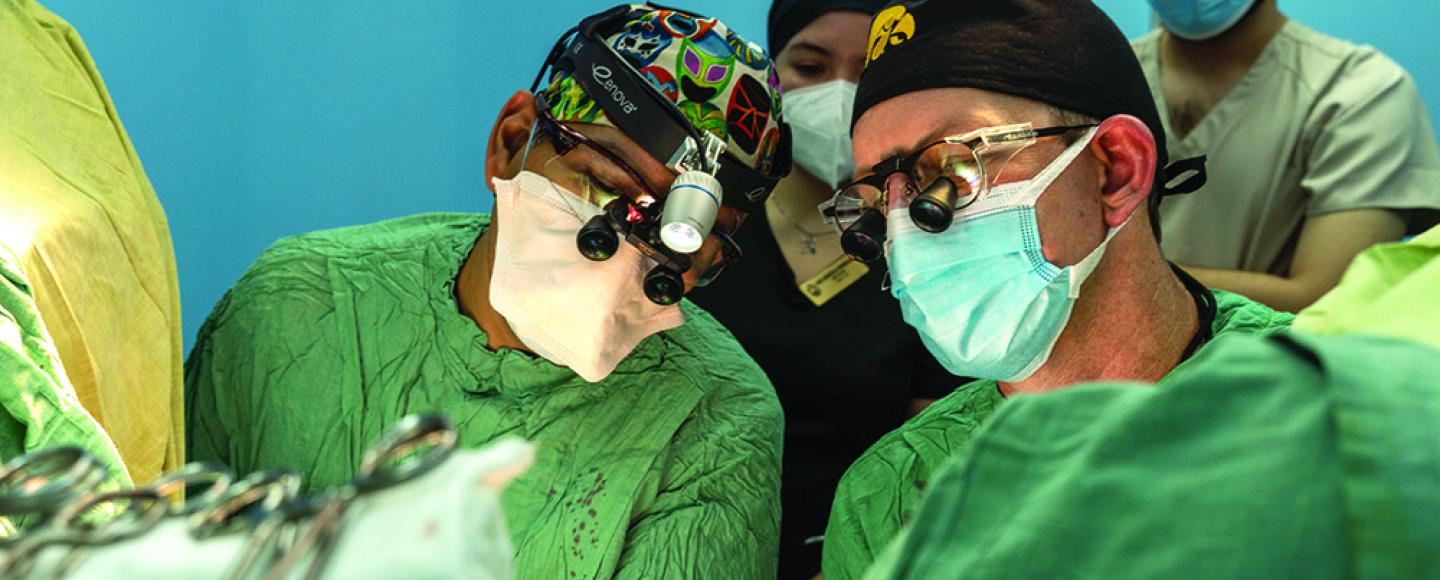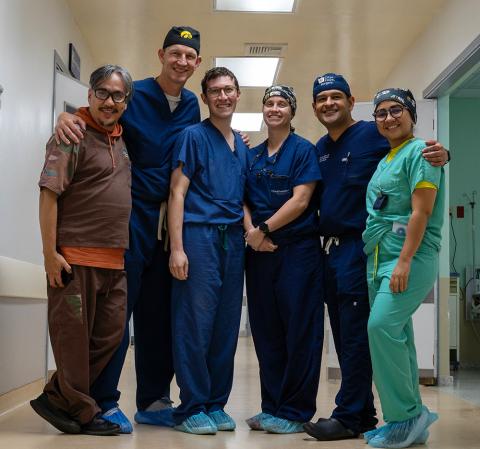Table of ContentsClose

Preserving and restoring quality of life
For Steven Hudak, urologic care isn’t just about patients’ physical health. It’s also about caring for the person whose quality of life, relationships, and family future may be tied to their health outcomes.
Steven Hudak (04MD), FACS, a reconstructive urologist who serves as the urology residency program director at UT Southwestern in Dallas, Texas, often tells trainees that when he started medical school, he had almost no familiarity with urology, much less reconstructive urology.
These days, he’s making it a priority to introduce the next generation of medical students and residents to the surgical field.
“It's kind of an interesting niche,” Hudak says. “It’s interesting surgery, interesting pathology, and it deals with intimate areas of people's lives.”
A reconstructive urologist’s clinic visits are much like any other physicians, he says, except in his 20-minute visits, the conversations almost always cover topics that are extremely difficult for patients to discuss.
“In the first minute and a half that you’re meeting somebody for the first time, a urologist is asking them about things that they may not share with their closest loved ones,” Hudak says.
‘Forgotten wounds’
Hudak’s medical school and residency years were supported by the Health Professions Scholarship Program, an initiative of the U.S. military that pays for medical education for those enlisted to military service who agree to fulfill residency training requirements at a military hospital.
“My time at Iowa was no different than anybody else; we have a Match Day similar to the civilian Match, except it occurs a couple of months before.” Hudak says. “Residency is just like residency in the civilian sector, except you’re wearing a uniform and caring for active service members, their families, and veterans.”
By the end of Hudak’s fellowship training, the greatest need for reconstructive urology care came from previously injured servicemen who were in the later stages of healing from catastrophic injuries sustained while serving overseas in Iraq or Afghanistan. When a service member is seriously injured in combat, Hudak explains, there may be widespread damage to multiple organ systems and areas of the body, requiring a long, complicated healing and rehabilitation process. Restoring the urinary tract is unlikely to be the first priority.
“Imagine someone has a head injury, bad burns, broken limbs, and a broken pelvis,” Hudak says. “The act of breaking their pelvis can also cause internal damage to the urinary tract. But rather than fixing that right away, we temporarily manage it with a drainage tube.”
This approach often put Hudak in the position of performing the last big operation someone experiences before they can return to their “new normal.”
“It can be very gratifying,” he says. “But then there are many times when other, nonsurgical things need to be addressed down the road—what we call the ‘forgotten wounds.’”
The effects of major injury to the genitourinary system can include incontinence, impotence, or the inability to have children.
“There is a mental health impact to all of that,” Hudak says. “There are things that we can help people cope with, but at times, you cannot make something completely normal again. It can be very difficult to help individuals cope when perhaps their injuries were too severe to be entirely fixed or replaced.”
Even through the challenges, Hudak feels it is a privilege to be allowed into his patient’s most personal and intimate life experiences.
“To be able to restore things that an individual thought couldn’t be done, but all they needed was the connection and access to specialized care—that can be extremely satisfying,” he says.
A surgeon on a mission
Hudak found his calling in reconstructive urology on a humanitarian mission trip during his third year of residency at Brooke Army Medical Center in San Antonio. Through a partnership with Honduran urologists, a group of U.S.-based specialists traveled to Honduras to treat patients with urologic problems that couldn’t be effectively managed due to lack of resources, time, or specialized training by local surgeons.
“I immediately connected to this combination of very, very complex surgeries in an area of the body that men value very highly but oftentimes aren’t interested in sharing with the world when they’re struggling in that area,” Hudak says.
After a marathon one-day clinic, the U.S. team populates a two-room concurrent operating schedule that runs 12 hours a day for a week straight. In that time, they attempt to clear out the backlog of cases that Honduran physicians have identified as needing advanced care.
“I’ve gotten to know many of them over the years, and they’re fantastic doctors,” Hudak says. “But in a country of more than 10 million, there are only about 40 urologists.”

Aside from the pleasure of providing a much-needed service to patients in a less-resourced country, Hudak says the U.S.-based surgeons benefit from performing a high volume of high- complexity surgeries.
“In one day, you’ll see more patients with unique problems than you might see over the course of a couple of months in a busy practice here in the States,” Hudak says.
Hudak traveled with the medical mission annually for more than 10 years, interrupted only by COVID-19 travel restrictions. In summer 2024, he returned to Honduras, and plans are underway to continue the annual mission, which has to date served nearly 500 patients.
“It’s a really important part of my ongoing career to mentor the trainees we take with us and hopefully inspire them to be involved in similar missions,” he says.
